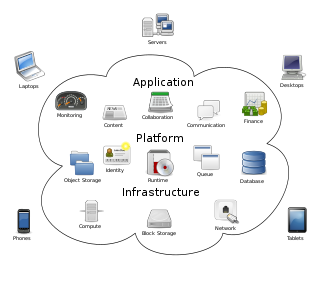
Ericsson is a Swedish multinational networking and telecommunications company headquartered in Stockholm. The company offers services, software and infrastructure in information and communications technology for telecommunications operators, traditional telecommunications and Internet Protocol (IP) networking equipment, mobile and fixed broadband, operations and business support services, cable television, IPTV, video systems, and an extensive services operation.

The Internet is the global system of interconnected computer networks that use the Internet protocol suite (TCP/IP) to link devices worldwide. It is a network of networks that consists of private, public, academic, business, and government networks of local to global scope, linked by a broad array of electronic, wireless, and optical networking technologies. The Internet carries a vast range of information resources and services, such as the inter-linked hypertext documents and applications of the World Wide Web (WWW), electronic mail, telephony, and file sharing.

Nokia Corporation is a Finnish multinational telecommunications, information technology, and consumer electronics company, founded in 1865. Nokia's headquarters are in Espoo, in the greater Helsinki metropolitan area. In 2017, Nokia employed approximately 102,000 people across over 100 countries, did business in more than 130 countries, and reported annual revenues of around €23 billion. Nokia is a public limited company listed on the Helsinki Stock Exchange and New York Stock Exchange. It is the world's 415th-largest company measured by 2016 revenues according to the Fortune Global 500, having peaked at 85th place in 2009. It is a component of the Euro Stoxx 50 stock market index.

A website or Web site is a collection of related network web resources, such as web pages, multimedia content, which are typically identified with a common domain name, and published on at least one web server. Notable examples are wikipedia.org, google.com, and amazon.com.
Network and networking may refer to:

A wide-area network (WAN) is any telecommunications network or computer network that extends over a large geographical distance/place. Wide-area networks are often established with leased telecommunication circuits.

A telecommunications network is a collection of terminal nodes in which links are connected so as to enable telecommunication between the terminals. The transmission links connect the nodes together. The nodes use circuit switching, message switching or packet switching to pass the signal through the correct links and nodes to reach the correct destination terminal.
Each terminal in the network usually has a unique address so messages or connections can be routed to the correct recipients. The collection of addresses in the network is called the address space.
Examples of telecommunications networks are:

CNBC is an American pay television business news channel that is owned by NBCUniversal Broadcast, Cable, Sports and News, a division of NBCUniversal, with both being ultimately owned by Comcast. Headquartered in Englewood Cliffs, New Jersey, the network primarily carries business day coverage of U.S. and international financial markets; following the end of the business day and on non-trading days, CNBC primarily carries financial and business-themed documentaries and reality shows.
A management information system (MIS) is an information system used for decision-making, and for the coordination, control, analysis, and visualization of information in an organization; especially in a company.
Online Business or e-business is any kind of business or commercial transaction that includes sharing information across the internet. Commerce constitutes the exchange of products and services between businesses, groups and individuals and can be seen as one of the essential activities of any business. Electronic commerce focuses on the use of ICT to enable the external activities and relationships of the business with individuals, groups and other businesses, while e-business refers to business with help of the internet. The term "e-business" was coined by IBM's marketing and Internet team in 1996.

A chamber of commerce is a form of business network, for example, a local organization of businesses whose goal is to further the interests of businesses. Business owners in towns and cities form these local societies to advocate on behalf of the business community. Local businesses are members, and they elect a board of directors or executive council to set policy for the chamber. The board or council then hires a President, CEO or Executive Director, plus staffing appropriate to size, to run the organization.
Vodafone Group plc is a British multinational telecommunications conglomerate, with headquarters in London and Newbury, Berkshire. It predominantly operates services in the regions of Asia, Africa, Europe, and Oceania. Among mobile operator groups globally, Vodafone ranked 4th in the number of mobile customers as of 2018.
A social networking service is an online platform which people use to build social networks or social relations with other people who share similar personal or career interests, activities, backgrounds or real-life connections.

The CW Television Network is an American English-language free-to-air television network that is operated by the CW Network, LLC, a limited liability joint venture between CBS Corporation, the former owners of United Paramount Network (UPN); and AT&T, whose WarnerMedia subsidiary is the parent company of Warner Bros., former majority owner of The WB. The network's name is an abbreviation derived from the first letters of the names of its two parent corporations.

A computer network is a digital telecommunications network which allows nodes to share resources. In computer networks, computing devices exchange data with each other using connections between nodes. These data links are established over cable media such as wires or optic cables, or wireless media such as Wi-Fi.

MyNetworkTV, is an American television network/syndication service that is owned by the Fox Corporation unit of 21st Century Fox, operated by its Fox Television Stations division, and distributed through the syndication structure of 20th Television. MyNetworkTV began operations on September 5, 2006 with an initial affiliate lineup covering about 96% of the country, most of which consisted of stations that were former affiliates of The WB and UPN that did not join the successor of those two networks, The CW. Under the ownership structure of 21st Century Fox, the service is incorporated as a subsidiary company known as Master Distribution Service, Inc.
Networking is a socioeconomic business activity by which businesspeople and entrepreneurs meet to form business relationships and to recognize, create, or act upon business opportunities, share information and seek potential partners for ventures.
A professional network service is a type of social network service that is focused solely on interactions and relationships of a business nature rather than including personal, nonbusiness interactions.

Cloud computing makes computer system resources, especially storage and computing power, available on demand without direct active management by the user. The term is generally used to describe data centers available to many users over the Internet. Large clouds, predominant today, often have functions distributed over multiple locations from central servers. If the connection to the user is relatively close, it may be designated an Edge server.












